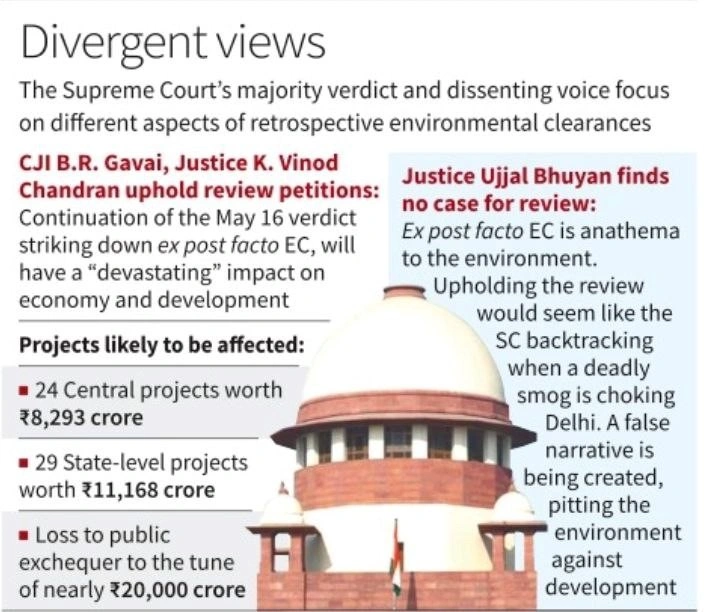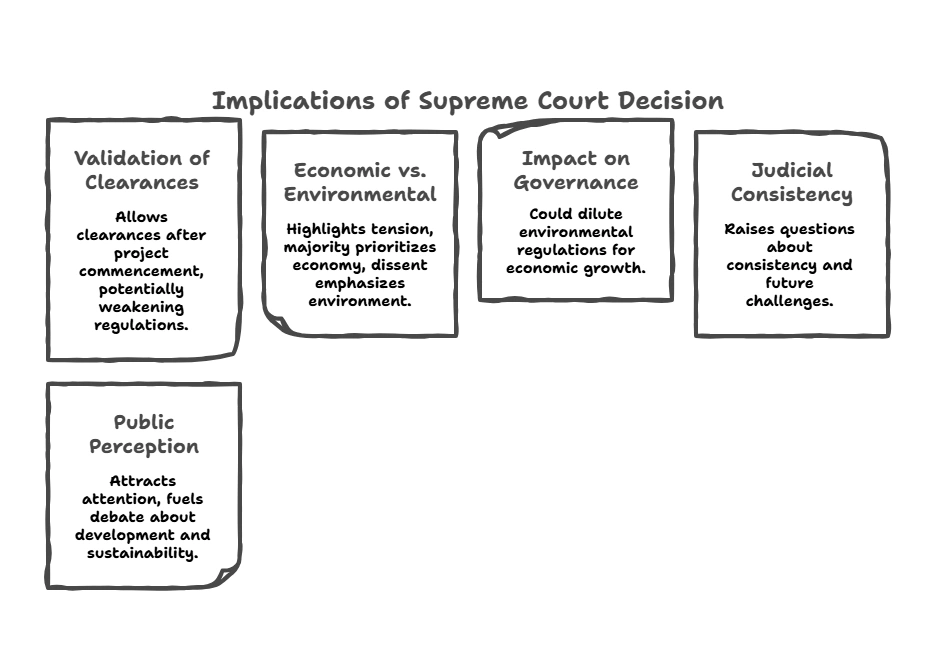Paper: GS – II, Subject: Polity, Topic: Judiciary, Issue: SC Recalls Verdict on Retrospective Green Clearances.
Context:
The Supreme Court, by a 2:1 majority, reversed its May 16, 2025, ruling against retrospective environmental clearances, citing economic harm, while the dissent warned this shift weakens environmental safeguards and accountability.
Key Takeaways:
Constitutional and Legal Framework:
- Fundamental rights and duties: Article 21 guarantees the right to life in a pollution-free environment.
- Article 51A(g) outlines the fundamental duty of every citizen to protect and improve the environment.
- Legal framework: The Environment (Protection) Act, 1986 is designed to enforce these rights and duties.
| The Supreme Court rule against its own decisions? The Supreme Court has the power to overrule its own decisions, but it has affirmed that this power will be used sparingly and only in compelling cases. But it has been fairly established that a Bench of the Supreme Court can’t overrule a previous judgment delivered by a bench of equal or larger size. |
Role of courts:
- The Supreme Court affirmed that it is the duty of constitutional courts to protect the environmental rights of citizens. This was also reiterated by the court in The M.C. Mehta case (lays down the concept of ‘absolute liability’),
- The Godavarman Thirumulpad case (redefined the concept of ‘forests’) and
- The recent (2024) case where SC ruled that citizens have a “right against the adverse effects of climate change”.
- This means development cannot come at the cost of the environment.

Majority Opinion:
- Justification for Recall: The Chief Justice of India (CJI) B.R. Gavai, along with Justice K. Vinod Chandran, formed the majority.
- CJI Gavai, nearing retirement, argued that the original May 16th judgment would have a “devastating effect” on numerous projects, leading to significant financial losses (“thousands of crores of Rupees would go to waste”).
- Public Interest: The majority opinion emphasized the broader public interest, suggesting that the economic consequences of upholding the original verdict outweighed the concerns about environmental violations.
Dissenting Opinion:
- Justice Ujjal Bhuyan’s Stand: Justice Ujjal Bhuyan strongly dissented, submitting a 97-page opinion criticizing the review judgment.
- Environmental Jurisprudence: He argued that the decision overlooked fundamental principles of environmental jurisprudence.

The Supreme Court’s recall highlights the tension between development and environmental protection. The majority prioritized practical and economic concerns, while the dissent stressed strict compliance shaping future debates on clearances and sustainable planning.
La Excellence IAS Academy, the best IAS coaching in Hyderabad, known for delivering quality content and conceptual clarity for UPSC 2025 preparation.
FOLLOW US ON:
◉ YouTube : https://www.youtube.com/@CivilsPrepTeam
◉ Facebook: https://www.facebook.com/LaExcellenceIAS
◉ Instagram: https://www.instagram.com/laexcellenceiasacademy/
GET IN TOUCH:
Contact us at info@laex.in, https://laex.in/contact-us/
or Call us @ +91 9052 29 2929, +91 9052 99 2929, +91 9154 24 2140
OUR BRANCHES:
Head Office: H No: 1-10-225A, Beside AEVA Fertility Center, Ashok Nagar Extension, VV Giri Nagar, Ashok Nagar, Hyderabad, 500020
Madhapur: Flat no: 301, survey no 58-60, Guttala begumpet Madhapur metro pillar: 1524, Rangareddy Hyderabad, Telangana 500081
Bangalore: Plot No: 99, 2nd floor, 80 Feet Road, Beside Poorvika Mobiles, Chandra Layout, Attiguppe, Near Vijaya Nagara, Bengaluru, 560040
